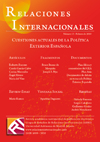Keywords:
International Relations , Iberianism, Spain , False friends , CognatesCopyright (c) 2010 Ángel RIVERO RODRÍGUEZ

This work is licensed under a Creative Commons Attribution-NonCommercial-NoDerivatives 4.0 International License.
Abstract
Portugal and Spain are two countries that share history, culture and geography. Nonetheless, this proximity has become many times a major obstacle for cooperation.
From the Portuguese point of view, Spain’s proximity has been permanently seen as a threat to Portugal’s independence. From the Spanish side, Portugal seems so close to Spain that can not be considered as a foreign country, but as part of a shared community, something that is not always well received by the Portuguese. Portugal permanently tended to differentiation and Spain responded by approaching. Here lies the root of misunderstanding.
These uneven perceptions of proximity and its value result in all kind of misunderstandings, because the will to self-differentiation can be understood as enmity, and the desire of approximation as lust of invasion. An instance of this can be seen in the word iberianism, which is written in the same way in both languages but can signify opposed meanings, like a false friend. Thus, iberianism points in both languages to the ideal of the political integration of the two peninsular countries. But in Portuguese this implies the subordination of national sovereignty to Spain and is associated with treason, whereas in Spanish denotes simply sympathy for Portugal.
In this article, I would like to show how the proximity between Spain and Portugal has been an obstacle in the relations between the peninsular countries in the sense that communication has been distorted by false friends, and worst, they become false friends in the sense that there is the assumption of a common purpose that never comes out as facts.





